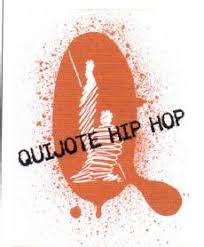 [Written in Madrid, Spain, in 2005.]
[Written in Madrid, Spain, in 2005.]
I was skeptical. An almost infinite number of events are being held this year in Spain for the 400th anniversary of the publication of the novel Don Quixote de la Mancha by Miguel de Cervantes. Now, the immortal text was going to be performed as rap. Spanish National Radio 3, the National Library, and the Province of Castilla La Mancha teamed up to create “Quixote Hip Hop.”
I wasn’t sure librarians and politicians were hip people, although the line-up of performers included top names: La Excepción, Zenit, Artes, and Korazón Crudo, the DJ Zeta, the graffiti artist Soso33, and the Dani Pannullo Dancetheatre Co. They planned to turn the novel into urban poetry.
The director of Spanish National Radio, Pedro Piqueras, in an interview on the day of the event, declared that the show was “the most recent madness that Radio 3 has gotten involved with, mixing a universal classic with the new ways that today’s youth speak, dance and express themselves.”
Everyone wants to be mad these days. It’s the quixotic thing to do.
The debut show Friday night, June 17, on the steps of the National Library was free, and my husband and I went. We arrived at sunset, 10:15 p.m. The garden in front of the library was packed. We found a spot on the crowded sidewalk behind the high iron fence. Slowly, the street behind us and finally the median strip filled with people, mostly young, but a number with gray hair and a few parents with small children.
On the library’s majestic steps, a relaxed and friendly producer explained the work, adding that some of the weird sounds in the music they were about to hear were by instruments from the age of Cervantes, such as a forerunner of the violin. He invited the audience to return during the daytime to see the library’s historic exhibit about El Quixote, “Biography of a Book.”
The large spotlighted statues in the staircase of Saint Isidoro and King Alfonso the Wise towered over him. A statue of Cervantes stood near the door, also in a spotlight. Panels alongside would display a light show. It was a hot night, and women fanned themselves.
Then fog billowed from the velvet curtains in the ornate formal entrance to the library. Music began. A young man dressed in loose, plain black clothing walked out and declaimed:
Digo, pues, que en un lugar
de la Mancha, en un paraje
de mucho campo y paisaje
cuyo nombre no he de dar
pues no quiero recordar …
He recited the opening text basically by the book: “I tell you, then, in a place / in La Mancha, in a location / in a rural countryside and landscape / that I shouldn’t name / since I don’t want to remember …”
The audience cheered and applauded. They were fans of the performers. As the hour-long performance went on, a few danced, but not many. They were too busy listening.
I can’t exaggerate the importance of Don Quixote in Spain — like Shakespeare in English-language culture, except even more. The rappers and the entire crew took their task seriously.
It worked. There was a match. Hip hop is all about words, and a book is nothing but words. Spanish language has the innate rhythm and easy rhyme to make the verses fall naturally. The assertive nature of hip hop mirrored the depth of the novel: “Four hundred years and it’s still the same / the essence of a human being.… Beauty and love have meaning.” A refrain insisted, “Passion isn’t crazy.”
The hip hop artists also proclaimed the importance of books, praised literature and culture, and proudly cited the portions of the text that their songs encompassed.
The encore, delivered by Korazón Crudo, reprised Chapter 3.
You can watch the show here.
